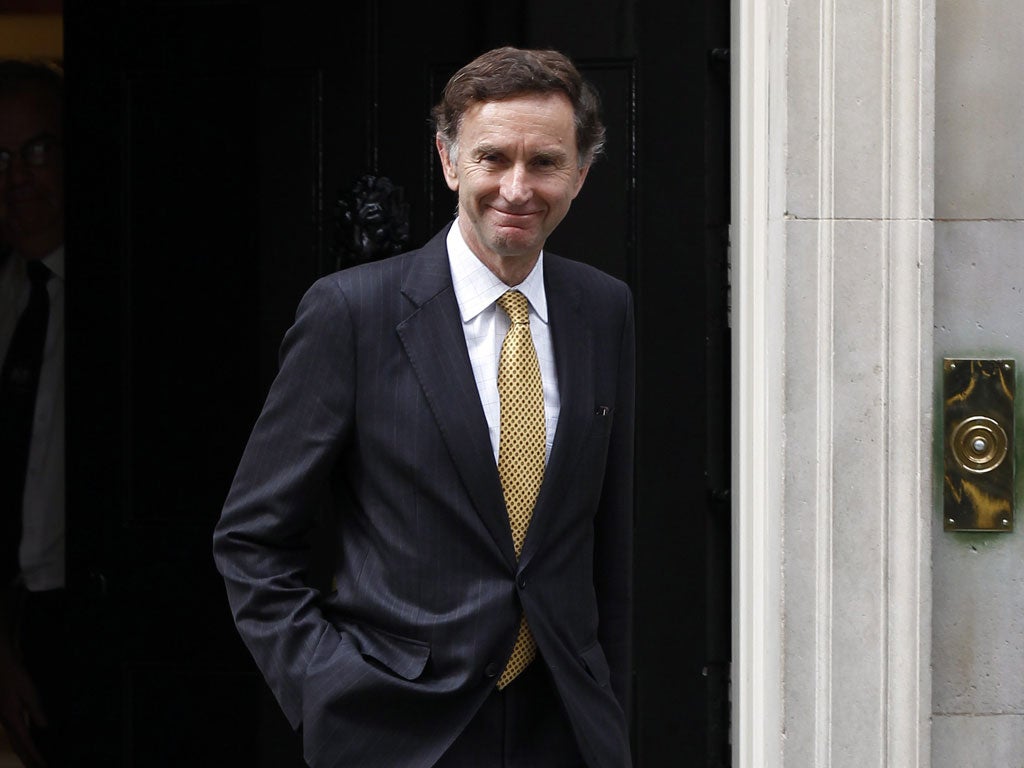HSBC emails add to pressure on minister
Lord Green must come clean on money laundering

Your support helps us to tell the story
From reproductive rights to climate change to Big Tech, The Independent is on the ground when the story is developing. Whether it's investigating the financials of Elon Musk's pro-Trump PAC or producing our latest documentary, 'The A Word', which shines a light on the American women fighting for reproductive rights, we know how important it is to parse out the facts from the messaging.
At such a critical moment in US history, we need reporters on the ground. Your donation allows us to keep sending journalists to speak to both sides of the story.
The Independent is trusted by Americans across the entire political spectrum. And unlike many other quality news outlets, we choose not to lock Americans out of our reporting and analysis with paywalls. We believe quality journalism should be available to everyone, paid for by those who can afford it.
Your support makes all the difference.Pressure on Lord Green, the trade and investment minister, to explain his role in the HSBC money-laundering scandal escalated last night, after documents showed he attended a meeting with senior bank staff at which "Iranian payments" were discussed.
Lord Green of Hurstpierpoint, who was chief executive and later chairman of Britain's biggest bank during the period of large-scale money-laundering at HSBC, has resisted calls by Labour to appear in the House of Lords to reveal how much he knew about the activities.
Labour's leader in the Lords, Baroness Royall, and the shadow City minister, Chris Leslie, stepped up calls for the minister to explain his role, as it emerged that Lord Green will be at the forefront of the Government's business campaign during the Olympics, hosting events that include a networking lunch on China Business Day on 27 July and a summit on healthcare and life sciences on 2 August.
The full scale of the HSBC scandal emerged last week when the Homeland Security sub-committee of the US Senate published a damning 340-page report into money-laundering at the bank, which included allowing cash transfers linked to Mexican drugs gangs, Iran, al-Qa'ida and Burma.
Emails published by the Senate committee, led by Carl Levin, a Democrat, show that Lord Green was copied in on a number of emails and attended a meeting in June 2005 at which, the emails claimed, top executives discussed how to make sure huge cash transfers from Iran would comply with US regulations on money-laundering.
David Bagley, the HSBC head of compliance who sensationally resigned during last week's Senate committee hearing into the investigation, wrote on 20 June 2005 that Iranian payments had been discussed in a meeting with Lord Green and the bank's top lawyer, Richard Bennett.
Mr Bagley wrote, in an email to another executive, David Hodgkinson, that Stephen Green, as he then was, wanted confirmation that the "agreed arrangements in relation to Iranian payments had been put in place" and that they would comply with the Office of Foreign Assets Control, a US regulator.
Mr Bagley wrote: "I thought it only right and proper however to alert you to the fact that Stephen is looking for confirmation that all payments are not being routed through HBME [HSBC Bank Middle East] via a non-Group clearer, or that a reasonably proximate date has been set by which time those arrangements will be in place."
The email suggests that Lord Green was alerted to the issue and was keen that the Iranian transfers complied with US regulations on money-laundering. There is no suggestion of wrongdoing on the part of Lord Green. However, despite the meeting, and the emails sent to Lord Green, money-laundering continued to be rife at HSBC for at least another two years. Lord Green was chief executive from 2003-06, before being appointed chairman. He stood down from the bank in 2010 when he was given a peerage and the job of trade minister by Mr Cameron.
Senator Levin said last week: "HSBC's chief compliance officer and other senior executives in London knew what was going on but allowed the deceptive conduct to continue." Contacted by The IoS yesterday, Senator Levin's office declined to comment on the role of Lord Green.
Mr Leslie, the shadow City minister, has written to Lord Green asking him to clarify what steps he took to crack down on money-laundering at the bank and its subsidiaries.
Mr Leslie wrote: "As a senior government minister with an ongoing role in banking policy, I would be grateful if you could place on the record – at the earliest opportunity – an assurance that you took every appropriate step if and when you became aware of the issues raised by this [Senate] report."
Mr Leslie also asked how far Mr Bagley shared his concerns with Lord Green about "deficiencies in HSBC anti-money-laundering controls".
Lady Royall added: "This is now a plain and simple question of ministerial accountability. Lord Green should come to the floor of the House this week and answer the many questions now being asked of his role at HSBC. For the Government to refuse to make him do so will... further erode trust in politics."
A spokesman for Lord Green said that the Senate report showed HSBC had introduced a "group-wide policy" to deal with money-laundering in response to the concerns raised in 2005.
Join our commenting forum
Join thought-provoking conversations, follow other Independent readers and see their replies
Comments